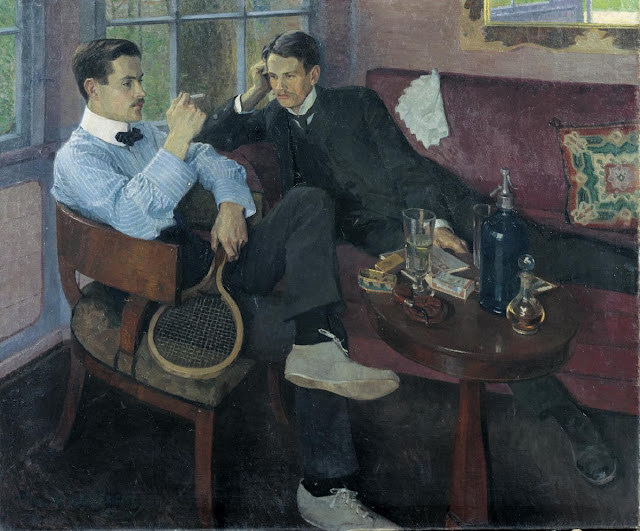 |
| Jünglinge im Gartenpavillion = Young Men in the Garden Pavillion (1904) Frederich Ahlers-Hestermann (German, 1883-1973) Oil on canvas 100 x 120.5 cm. |
Wednesday, May 19, 2021
Junglinge im Gartenpavillion by Friedrich Ahlers-Hestermann
Tuesday, May 4, 2021
Maurice by E. M. Forster
 |
| New York : W. W. Norton, 1971 |
The novel quickly moves through the public school years which are defined by maintaining a facade to show adherence to the expected behavior. Maurice is aware of this in himself, but because he is equally aware of it in his classmates, he doesn't connect it directly to his sexuality.
While at Cambridge, Maurice befriends Clive Durham who talks to him about his shunning of religion and educates him on the Greek classics, in particular those which defend or describe male relationships—Plato's Symposium for instance. What should be an obviously increasing closeness between the two is not at all obvious to Maurice who is surprised when Clive suddenly professes his love.
If anything is known about the book's storyline, it is the relationship between Maurice and Alec Scudder, the game keeper at Penge, the Durham estate. The arc of the book, however is Maurice's journey toward being ready for that relationship. The confusion about one's feelings, the searching for a cure to one's feelings, the desire to be normal, are all too familiar for many future gay lives as well as the later novels that describe them.
The problems of class are on full display in Maurice. Early in the novel, it is quite clear that Maurice doesn't spare a thought for the lower class, and in some cases is actively unkind to those who inhabit it. It isn't simply that different characters are from different classes, it's how it is possible for them to live based on their position and that they have to always consider it when making choices in their lives. While Clive and Maurice are ostensibly from the same class, Clive's family is landed and have served in government, so have a very different role than Maurice's family which runs a financial firm. And, of course Alec, who works in service, has yet different possibilities for his life. Maurice and Alec's relationship, while already complicated by sexuality also has the added layer of class difference.
 |
| Abinger Edition : 5 London : André Deutsch, 1999 |
A key piece from the original 1914 manuscript that was dropped early by Forster is an epilogue that gives the reader a window into Maurice and Alec's life five years on. When Maurice's sister, Kitty, runs into him, he is working with Alec as a woodsman. The chapter, written primarily from Kitty's point of view, makes it clear that Maurice's choice has left himself and his family in disgrace and that he is no longer in contact with them. While he and Alec seem as committed to one another as ever, their life is not easy. After running into Kitty, they decide they must move on. It is interesting to see that Forster was realistic about what the future might hold for his characters, but by eliminating the epilogue he gave the reader a more uplifting ending with possibilities for Maurice and Alec.
One of the important things about reading classics of gay literature is a consideration of gay legacy and understanding the history of those that came before. Maurice is a beautiful example of acknowledging the long history of gay men and culture through the use of classics of Greek literature within the storyline, showing Clive and Maurice trying to understand themselves and their feelings by knowing their history. As well, the basis of the novel grew out of of the relationship that Forster saw between Edward Carpenter and his working-class partner George Merrill. It is the honoring of gay men who came before while passing the torch to the next generation.
Subscribe to:
Posts (Atom)